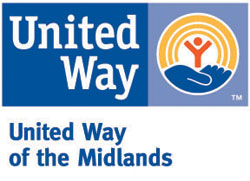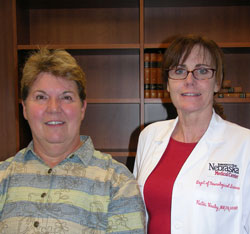 When it comes to helping patients with Multiple Sclerosis (MS), UNMC and the Nebraska Chapter of Multiple Sclerosis work as sister organizations.
When it comes to helping patients with Multiple Sclerosis (MS), UNMC and the Nebraska Chapter of Multiple Sclerosis work as sister organizations.
“We’re on the phone with them everyday,” said Kathleen Healey, Ph.D., nurse practitioner in neurological sciences, who has worked in the UNMC MS clinic for 11 years.
More than 1,000 patients are seen at UNMC’s MS Clinic, where up to 175 new patients are diagnosed every year. Most of the people in Nebraska who suffer from MS are treated at UNMC.
Early diagnosis and treatment is the key, she said. The standard drugs for MS are effective in reducing relapse rate and stabilizing disability. There is a greater window of opportunity to prevent disability down the road if treatment is started early. Advances in treatment include new drugs available, mostly monoclonal antibodies, which are showing great promise in effectively controlling the disease.
“With most cases of MS, a person’s life span is essentially normal, but the quality of life is affected, from mild to severe disability. Its course is as different as a fingerprint in each individual,” Dr. Healey said.
UNMC is a member of the MS Consortium, an international group of experts in MS. They share information, keep abreast of cutting-edge treatments and research.
 |
Mary Filipi, Ph.D., left, and Kathleen Healey, Ph.D. |
The MS Society — which is one of the organizations UNMC employees can pledge money to during the UNMC United Way Campaign — is a valuable resource for newly diagnosed patients, Dr. Healey said.
“They provide patient education materials, support groups, network opportunities and direct assistance,” she said.
Any patient can apply to the MS Society for funds to cover costs related to the disease. Patient needs include such things as mobility devices, transportation to health or fitness centers and monthly fees for fitness centers.
“We help patients apply for these funds,” Dr. Healey said.
The daily communication between UNMC and the MS Society plays a significant role in the lives of the patients, said Kelly Nelson, program coordinator for the National Multiple Sclerosis Society, Nebraska Chapter.
“We value the partnership with UNMC and the impact it has on individuals with MS,” Nelson said. “We have 18 support groups across Nebraska and Pottawattamie county in Iowa. UNMC’s nurse practitioners are always willing to speak to our groups. They also volunteer to serve on our board and the programs committee.”
Donations to the MS Society also fund research across the country. One grant is supporting the research of Tom Petro, Ph.D., at the College of Dentistry.
Dr. Petro, professor of microbiology and immunology in the department of oral biology, has adopted a mouse model to study the effect of resveratrol on MS. He has a one-year $44,000 grant, through which he plans to obtain preliminary results to help him apply for a National Institutes of Health grant.
Resveratrol, found in many plants and foods, such as the skin of red grapes, red wine and in nuts, appears to have an anti-inflammatory effect.
“There’s an inflammation associated with MS, as well as gingivitis, rheumatoid arthritis and juvenile diabetes that’s chronic,” Dr. Petro said. “We don’t know where it comes from. I suspect this research will have an impact on all these diseases.
“My hypothesis is that resveratrol could help prevent or lessen the existing neuronal inflammation associated with MS. Positive results of this study could lead to human trials,” he said.
Dr. Petro referenced a study published last year in the scientific journal Nature in which researchers at the Harvard Medical School and the National Institute on Aging reported that resveratrol offsets the bad effects of a high-calorie diet in mice and significantly extends their lifespan.
“Other studies have shown that resveratrol shows remarkable results in reducing inflammation. The mice lived longer and didn’t get sick. It had a global affect,” he said.
Three levels of resveratrol are being tested in the mouse diet. After being on this diet for several weeks, Dr. Petro will introduce the inflammation associated with MS to see how long it takes before the mice show MS-like symptoms. Later, in a different experiment, he will induce MS into mice and then start them on the diet.
MS starts as a mysterious inflammation that triggers the body’s immune system, but something goes wrong. The immune system begins to attack the body, specifically the myelin — a fatty tissue that surrounds and protects the nerve fibers of the central nervous system. In MS, myelin is lost in multiple areas, leaving scar tissue called sclerosis. These damaged areas are also known as plaques or lesions. The nerve fiber itself also can be damaged or broken.
Myelin not only protects nerve fibers, it makes their job possible. When myelin or the nerve fiber are destroyed or damaged, the ability of the nerves to conduct electrical impulses to and from the brain is disrupted, and this produces the various symptoms of MS.
Balance becomes a problem for more than 80 percent of the MS patients, said Mary Filipi, Ph.D., assistant professor of adult health and illness in the College of Nursing. She is conducting a balance study that is funded by a $50,000 three year renewable grant from the private donor, the MARS Foundation, from Ames, Iowa.
Dr. Filipi, who has been a nurse practitioner with UNMC’s MS clinic for 12 years, has found that resistance training helps MS patients with balance. As part of her study, she is evaluating patient’s balance with the help of an interdisciplinary residency program between UNMC’s physical therapy department, the full gait and kinesiology laboratory at the University of Nebraska at Omaha, and the Fast Forward Gym, owned by an MS patient, for the training program.
She also is studying how to prevent osteoporosis, a problem from which nearly 60 percent of new patients suffer.
“Conventional wisdom was that steroids or the lack of movement caused bone breakdown. But then we saw that 80 percent of the fracture risk was with people who were mobile,” she said. This $109,000, five-year study is funded by Aventis and Proctor and Gamble Pharmaceuticals.
“Our MS patients are the best in the world,” Dr. Filipi said. “They give more to us than we give to them. Their attitude is inspirational. We’ve been blessed many times over with our patients, so we want to do the best for them.”